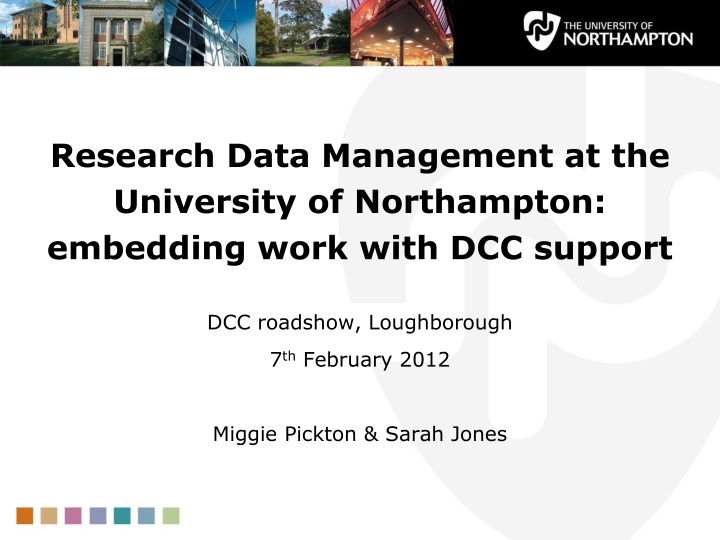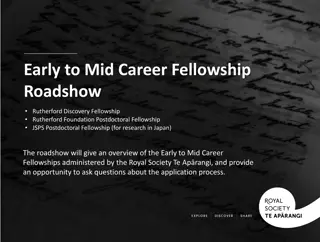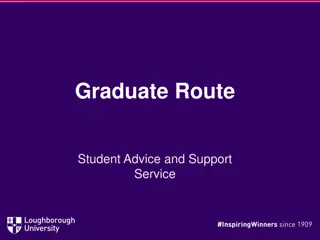
Effective Research Data Management at University of Northampton
Learn how the University of Northampton is enhancing research data management through collaboration with the Digital Curation Centre (DCC). Discover the significance of conducting research data projects and implementing policies to support researchers in managing their data effectively. Explore the four steps of the Data Asset Framework (DAF) methodology for improving data management practices.
Uploaded on | 1 Views
Download Presentation

Please find below an Image/Link to download the presentation.
The content on the website is provided AS IS for your information and personal use only. It may not be sold, licensed, or shared on other websites without obtaining consent from the author. If you encounter any issues during the download, it is possible that the publisher has removed the file from their server.
You are allowed to download the files provided on this website for personal or commercial use, subject to the condition that they are used lawfully. All files are the property of their respective owners.
The content on the website is provided AS IS for your information and personal use only. It may not be sold, licensed, or shared on other websites without obtaining consent from the author.
E N D
Presentation Transcript
Research Data Management at the University of Northampton: embedding work with DCC support DCC roadshow, Loughborough 7thFebruary 2012 Miggie Pickton & Sarah Jones
Outline Introduction - research at The University of Northampton Why conduct a research data project? DAF at Northampton 4 steps Findings and recommendations From project to policy From policy to practice How the DCC will help
Introduction - research at UoN About The University of Northampton: Achieved university status and research degree awarding powers in 2005 Aiming to become a leading regional, national and international centre for research and knowledge transfer (from the university s Strategic Vision, 2005) Increased focus on research and supporting the research community 150+ research students, ??? research active staff numbers are rising Like everyone else... thinking about the REF 3
Why conduct a research data project? Little was known centrally about university researchers data storage requirements, or the research workflow that incorporates the creation and management of data No university wide data storage policy or procedure existed Research funders are beginning to demand that data as well as published research outputs are made openly available In NECTAR (our institutional repository), we had available the infrastructure to store and preserve digital data Reaching the researchers previous studies had noted that the process of undertaking a DAF project had been valuable in itself, even if the resulting inventory of data was only partial
Research Data Project four steps The DAF methodology comprises four steps: Stage 1 is for planning, defining the purpose and scope of the survey and conducting preliminary research. Stage 2 is about identifying what data assets exist and classifying them to determine where to focus efforts for more in-depth analysis. Stage 3 is where the information life cycle is considered to understand researchers workflows and identify weaknesses in data creation and curation practices. Stage 4 pulls together the information collected and provides recommendations for improving data management. (Digital Curation Centre, 2009, p.5)
DAF at Northampton Project team: two project researchers (graduate interns) plus a Project Board comprising staff with expertise in repositories, records management and collection development Ran from May to June 2010 (eight weeks) Data collection, three stages: Initial interviews with research leaders in each School; online survey of researchers; one-to-one interviews with researchers Topics covered: Types, sizes and formats of research data; data ownership; storage; security; sharing and access (short and long term); funders requirements
Selected findings (1) 80 researchers responded to the survey and 16 agreed to take part in the follow-up interviews; all Schools were represented Some common behaviours identified e.g. overwhelming use of Microsoft software for creating documents and spreadsheets (.doc/.docx and .xls/.xslx files); .jpeg preferred for images Greater variation in software and hence file types used for databases, audio and video
Selected findings (2) Data storage needs, behaviours and vulnerabilities vary through the research lifecycle: Central Storage Project End Email USB/Flash Drive External Hard Drive University Shared Drive Paper Dictaphone Video Camera Web Based Program Campus Computer Home Computer Laptop CD/DVD Paper External Drive Data Collection Backup A few researchers had previously lost data but most performed regular backups to avoid this.
Selected findings (3) Researcher views on open access to data: 56% of participants agreed that they would like a university repository to store their research data, but not necessarily to offer open access Responses varied by School (Business and Education most in favour, Health and Social Science most against) Examples were given of funders who expressly forbade sharing of data Most researchers had not applied for funding from a body that required open access to research data
Recommendations Nine recommendations made, covering: Reporting to senior research managers and leaders Creation of research data policy (and procedure to support it) Clarification of ownership of research data Training and guidance (a role for Information Services) Dissemination of findings (Full results and recommendations are described in the project report see Alexogiannopoulos et al., 2010)
From project to policy October 2010 DAF project report presented to University Research Committee (URC) November 2010 - URC Research Data Working Group convened to discuss: Scope of policy Fit with research lifecycle Procedure to support policy Relationship with other university policies and practices (e.g. research ethics; academic misconduct) November-December 2010 policies from other institutions reviewed
From project to policy January 2011 discussions with the DCC re generic version of DMP Online January 2010 first RDM proposal presented to URC: RCUK recommendations to be followed (RCUK, 2009) Principal Investigator to complete a data management plan at the start of every project (DMP Online recommended for this purpose) A central dedicated storage facility for research data to be provided Support and training to be offered to researchers Members of URC expressed concern
From project to policy URC concerns: Duplication of effort - we have to do this already ... for funders, professional bodies, etc. Relevance or applicability to different disciplines Reluctance to set disposal date (or even review date) I d be very upset if my data were deleted ... Aversion to procedures being mandatory Expense who will pay for it? So back to the drawing board...
From project to policy Revised proposal eventually approved by URC in June 2011: Emphasis on encouragement rather than mandate No longer expected for every research project Simplified internal procedures Default five year review period Additional help offered for identifying external data archives
Next steps: from policy to practice As yet the policy has not had a major impact. Before this will happen we need to: 1. Disseminate the new policy to all Schools and Divisions 2. Develop RDM training programme paying particular attention to the needs of different disciplines 3. Fulfil our commitment to provide a dedicated research data storage facility 4. Promote the importance and value of effective data management and sharing 5. Seek ways to support the embedding of good data management practice in research workflows
How can the DCC help to take this work further?
What is the DCC? a centre to support HEIs with Research Data Management Develop tools: DAF, DRAMBORA, DMP Online, CARDIO Offer guidance: helpdesk, briefing papers, how-to guides Run training & events: DC101, roadshow, RDMF, IDCC Support the JISC MRD programmes www.dcc.ac.uk
How is the DCC helping institutions? Working intensively with 18 HEIs to increase RDM capability 60 days of effort per HEI drawn from a mix of DCC staff Deploy DCC & external tools, approaches & best practice Support varies based on what each institution wants/needs Lessons & examples will be shared with the community http://www.dcc.ac.uk/community/institutional-engagements
What can the DCC offer? Institutional data catalogues Assess Needs Workflow assessment Pilot RDM tools Develop support and services DAF & CARDIO assessments DCC support team Guidance and training RDM policy development Advocacy with senior management Customised Data Management Plans Make the case
What is planned at Northampton? Move from policy to practice 1. Communicate the research data management policy 2. Provide a dedicated research data storage facility 3. Develop research data management training paying particular attention to disciplinary needs 4. Roll out good practice through advocates
A staged approach We aim to run 6 exemplars that represent most contexts: One from each School, and one cross-school Mix of funded and unfunded research Early career and established researchers Lone academics and large collaborations Different types of data (scale, complexity, openness)
The exemplars Researchers invited to participate by Executive Dean for Research We re proposing to buy out some researchers time as an incentive The exemplars will: Trial and feedback on RDM policy Create a DMP Deposit data Provide practical case studies for guidance and training Support the development and running of RDM workshop series Act as advocates of good practice to achieve snowball effect
Thanks miggie.pickton@northampton.ac.uk sarah.jones@glasgow.ac.uk Acknowledgement The University of Northampton is grateful to JISC for funding the KeepIt project through which we were introduced to DAF and to the Graduate Boost programme for supplying the two project researchers, Sam McKenney and Edward Alexogiannopoulos, to run the DAF survey.














